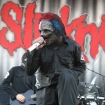You can't talk about metalcore, post-hardcore, or, hell, even heavy music in the 21st century without talking about Underoath. The Tampa, Florida, band formed in the late Nineties when their founding members were still in high school, but it wasn't until the mid-2000s that they'd become arguably the foremost metalcore band in the world and definitely one of the most iconic heavy acts of their time. However, those marks haven't been attained without a fair share of struggles: pivotal lineup changes, stark stylistic switch-ups, and a brief breakup in the mid-2010s. Throughout their storied history, Underoath have endured several distinct sonic eras, which makes ranking their discography a challenging and contentious task.
Underoath have never put out a bad album, but when you listen deeply to everything they've put out, there is a clear hierarchy to be established. Here's what we came up with.
9. Act of Depression
If you played an Act of Depression song for someone who's only a tangential Underoath fan, they likely wouldn't believe that this is the same band — and in many ways they aren't. Drummer-clean vocalist Aaron Gillespie is the only current member who played on the band's 1999 debut, and he was only 16 years old when it was released. At the time, Underoath were fronted by Dallas Taylor (who went on to form Maylene and the Sons of Disaster) and they played a brutal combination of first-wave metalcore, death metal, black metal and even spastic notes of grindcore. This record is only six songs long, two of them clock in over the 10-minute mark (more than double the length of their later-period tracks), and their sound is missing the big-room emo singalongs that they became known for in the mid-2000s. It's definitely their heaviest and rawest release, but that comes at the expense of it sounding severely underdeveloped.
8. Cries of the Past
Exactly one year after their first outing, Underoath returned with a similar sounding but notably more polished follow-up, Cries of the Past. Like its predecessor, this record has a short track list, none of the songs are less than seven-minutes long, and the style is closer to black and death metal than anything you'd hear coming out of your local mall speakers. It's definitely a step-up in the production and performance departments, and the inclusion of keyboardist Chris Dudley added some classical ambience that set them apart from other metalcore bands of the time. But overall, like Act of Depression, this sounds so different and dated next to everything that followed that it feels weird even calling this an Underoath album.
7. The Changing of Times
Two years later, the band issued their final record with Taylor on the mic, and its fittingly titled The Changing of Times. It also marked their first LP on the influential Christian metalcore imprint Solid State Records, which is worth noting because this album sounds way more in-line with labelmates like Norma Jean and Demon Hunter, bands who specialized in the melodic form of metalcore of which Underoath would soon become the reigning kings. Still, The Changing of Times sounds more like their take on Warped Tour-approved screamo bands like Thursday, the Used, and From Autumn to Ashes than what they'd do later on in the decade. It was definitely their first flash of promise as a band who could balance rock and metal elements simultaneously, but it was still missing the "it" factor that arrived a couple years later.
6. Erase Me
When Underoath temporarily broke up in 2013, Gillespie had been out of the band for a few years working on his alt-rock group the Almost, and Chamberlain immediately formed the industrial-tinged rock band Sleepwave. Therefore, it's understandable that Underoath's big 2018 return record is their most melodic yet. There are plenty of massive hooks on here and some of the most compelling synth textures in their whole catalog, but it feels one-sidedly rock-forward and therefore lacks the band's signature blend of crushing and catchy. Still, Underoath have never been a band that's made concessions, and it's admirable that they reunited on their own terms and made a record that's was true to what they wanted to make then.
5. Voyeurist
For old-school fans, Voyeurist was a welcome realignment. Opening with the fiery, scream-filled "Damn Excuses," Underoath were loudly proclaiming that the pop-forward leanings of Erase Me were behind them, even if the album isn't quite as heavy on a whole as their 2000s catalog. Songs like "Hallelujah" and "I'm Pretty Sure I'm Out of Luck and Have No Friends" feature ethereal layers of sound, while others like the Glassjaw-esque "Take a Breath" teeter on a cliff-side of sheer mayhem without ever taking the jump. The 2022 release is Underoath's most sonically diverse and adventurous record yet, as embodied by its sidewinding closer, "Pneumonia," a seven-minute journey that starts off quiet and ends in a noisy, roiling sludge-metal jam.
4. Ø (Disambiguation)
2010's Ø (Disambiguation) is the band's only album without Gillespie on the kit, and the group did a surprisingly effective job at supplanting his iconic playstyle with more muscular instrumental choices: passages that verge on prog metal, darker synth tones, and even some stray guitar solos. Chamberlain's clean vocals are a little more gravelly than Gillespie's nasally belt, but he still managed to make the hooks pop. While an understandably divisive and often overlooked record in the Underoath discography, it served as a formidable follow-up to the titanic Lost in the Sound of Separation that didn't forego an inch of heaviness.
3. They’re Only Chasing Safety
They're Only Chasing Safety is Underoath's first act of brilliance. Their 2004 record welcomed not just Chamberlain into the group, but also guitarist James Smith and bassist Grant Brandell, which solidified the band's revolving lineup and thus formed one of the most cohesive units in the history of metalcore. On this fan-favorite record, Gillespie's soaring vocals were given ample room in the spotlight, ushering in a newfound melodicism that Chamberlain evened out with his decimating shrieks. It was the beginning of a new era for Underoath and the mid-2000s metalcore scene that they'd go on to spearhead, and you can really hear the excitement and chemistry coming through on these recordings. There are better Underoath albums, but the energy they captured on here is unparalleled.
2. Lost in the Sound of Separation
Lost in the Sound of Separation is undoubtedly the most epic and grandiose Underoath album to date. On their 2008 release, the band pushed the technical heaviness of 2006's Define the Great Line to even wilder extremes, resulting in the post-metal majesty of a song like "Emergency Broadcast: The End Is Near" and the ferocity of a track like "Desperate Times, Desperate Measures". The through-composed songwriting on this album makes their intense metalcore sound cinematic, and the many transitions within each song are smooth yet unexpected. Also, the whole thing ends on a curiously experimental note with the slow-burning "Too Bright to See, Too Loud to Hear" and the mostly electronic "Desolate Earth: The End Is Here," which sounds like a mid-period Radiohead song until its screamed ending. It's not their most conventionally listenable or catchy record, but Lost in the Sound of Separation lives up to its soaring ambitions.
1. Define the Great Line
It's simply the best one. Finding perfect harmony between the crowd-pleasing hookiness of They're Only Chasing Safety and the maelstrom-like epicness of Lost in the Sound of Separation, Underoath's 2006 release, Define the Great Line, is their bonafide masterpiece. Whereas Safety has the biggest and most undeniable choruses in their catalog, the songs sometimes felt like they hinged on their melodic elements, while Lost in the Sound of Separation got a little headier than some fans wanted. Define the Great Line features well-rounded songwriting, intricate musicianship, and the most seamless back-and-forths that Chamberlain and Gillespie have ever recorded. Although it only arrived two years after Safety, this record sounds a good half-decade ahead of its time and its influence on an entire generation of metalcore bands is unquantifiably vast.








